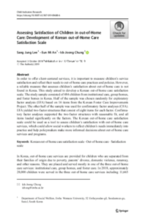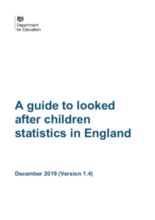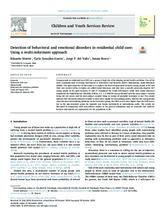Displaying 371 - 380 of 1510
This article explores and presents the voices of children regarding how they experience their participation in multidisciplinary meetings at a child and youth care centre.
This study aimed to develop a Korean out-of-home care satisfaction scale. The study sample consisted of 484 children from institutional care, group homes, and foster homes in Korea.
This article describes the development of two parenting groups – Nurturing Attachments and Foundations for Attachment, devised to provide much needed support for foster, residential and kinship carers and adopters parenting children and young people of all ages. Both programmes are informed by the Dyadic Developmental Psychotherapy (DDP) model.
This country care review includes the care related Concluding Observations adopted by the Committee on the Rights of the Child and the Committee on the Rights of Persons with Disabilities.
The following article reports upon recent research that explored the perceptions of professionals of the issues that affect the sexual and criminal exploitation of children in care, along with a discussion of the effectiveness of current responses to these issues and the challenges that professionals face.
To investigate the early language development of children raised in institutional settings in the Russian Federation, the authors of this study compared a group of children in institutional care to their age‐matched peers raised in biological families, who have never been institutionalized using the Russian version of the CDI.
This document provides a guide to looked after children statistics published by the UK Department for Education.
The main focus of this chapter is to define institutions, their objectives and the nature of services rendered.
Cross-sectional analysis by the Scottish Government show that the educational outcomes for looked after children are much poorer than for other children in Scotland. This presentation will discuss methods to create a longitudinal data set from these data and thus infer how a child’s lifetime history of care relates to their educational outcomes.
The main objective of this study is to analyze the level of agreement between young people in residential care (RC) and their care workers (who, in Spain, are called social educators, and who have a specific university degree).




